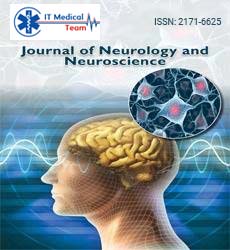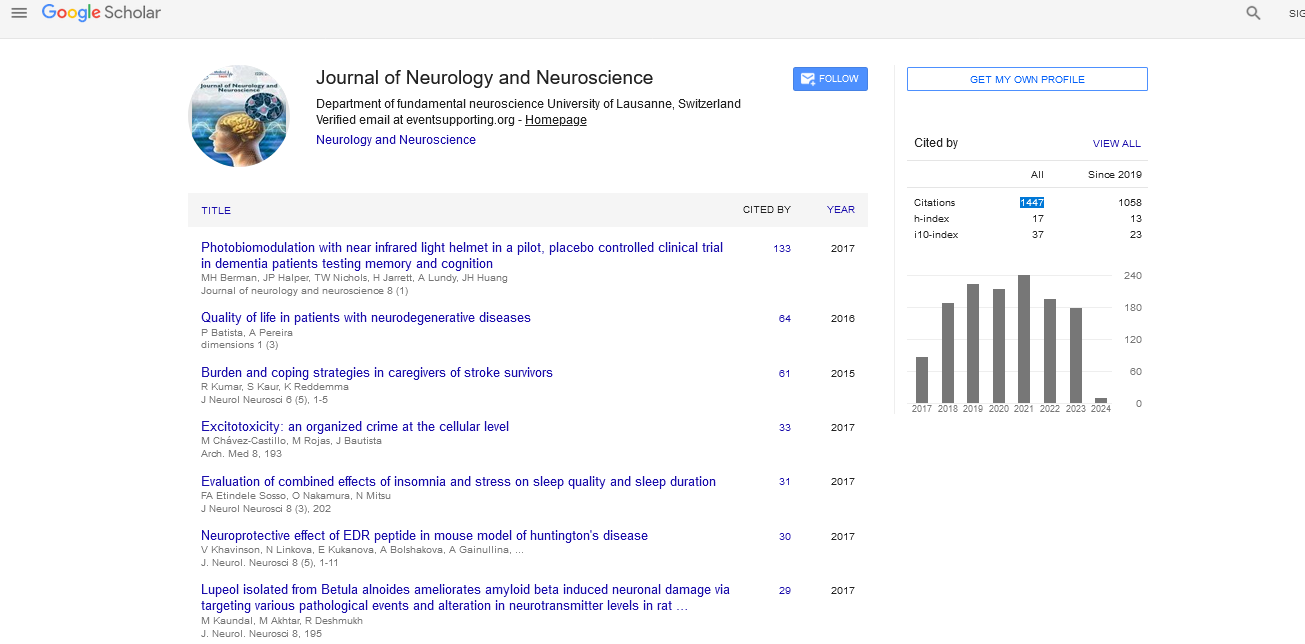Perspective - (2023) Volume 14, Issue 3
Understanding the gut-brain axis: Implications for neurological disorders and mental health
Jessica Lee*
Department of Neuroimaging, McGill University, Montréal, QC H3A 0G4, Canada
*Correspondence:
Jessica Lee, Department of Neuroimaging, McGill University, Montréal, QC H3A 0G4,
Canada,
Email:
Received: 29-May-2023, Manuscript No. ipjnn-23-13916;
Editor assigned: 31-May-2023, Pre QC No. P-13916;
Reviewed: 14-Jun-2023, QC No. Q-13916;
Revised: 20-Jun-2023, Manuscript No. R-13916;
Published:
28-Jun-2023
Introduction
The gut-brain axis represents a bidirectional
communication pathway between the gut and the central
nervous system, linking the enteric nervous system of the
gut with the brain. This intricate connection plays a vital
role in various physiological processes, including digestion,
metabolism, and immune function. In recent years,
research has shed light on the profound influence of the
gut-brain axis on neurological disorders and mental health.
This review explores the understanding of the gut-brain axis
and its implications for neurological disorders and mental
health. We discuss the mechanisms underlying the gutbrain
communication, the role of gut microbiota, immune
system interactions, and neurotransmitter signaling.
Furthermore, we delve into the impact of the gut-brain
axis on neurological disorders, such as Parkinson's disease,
autism spectrum disorders, and mental health conditions,
including depression and anxiety. Understanding the
complex interplay between the gut and the brain offers
potential avenues for novel therapeutic strategies and the
promotion of mental well-being [1].
Description
The gut-brain axis involves a sophisticated network of
bidirectional communication pathways. It encompasses the
interaction between the gut microbiota, gut epithelium,
enteric nervous system, autonomic nervous system, and the
central nervous system. Communication occurs through
various mechanisms, including neuroendocrine signaling,
immune system modulation, and neurotransmitter
production [2]. The gut microbiota, a diverse community
of microorganisms residing in the gastrointestinal tract,
plays a pivotal role in gut-brain axis communication.
These microorganisms produce metabolites and
neurotransmitters that can influence brain function and
behavior. Additionally, the gut microbiota interacts with
the immune system, regulating immune responses that can
impact brain health and neuroinflammation [3].
Neurotransmitters, such as serotonin, dopamine, and
Gamma-Aminobutyric Acid (GABA), produced in the
gut, influence mood, cognition, and behavior. They can
cross the blood-brain barrier and interact with neural
circuits in the brain. Furthermore, the vagus nerve, a
major pathway of communication between the gut and the
brain, transmits signals and regulates autonomic functions
[4]. The dysregulation of the gut-brain axis has been
implicated in various neurological disorders and mental health conditions. For example, in Parkinson's disease,
alterations in gut microbiota composition and function
may contribute to the development and progression of the
disease. Similarly, disruptions in the gut-brain axis have
been observed in autism spectrum disorders, affecting
behavior and cognitive function. Mental health conditions,
such as depression and anxiety, have also been associated
with alterations in gut microbiota and gut-brain signalling
[5].
Conclusion
Understanding the complex interplay between the gut
and the brain through the gut-brain axis has opened new
avenues for exploring the pathophysiology of neurological
disorders and mental health conditions. The bidirectional
communication between the gut and the brain, involving
the gut microbiota, immune system, and neurotransmitter
signaling, influences various physiological and behavioral
processes.
Harnessing the potential of the gut-brain axis offers
exciting opportunities for therapeutic interventions.
Strategies targeting the gut microbiota through prebiotics,
probiotics, or fecal microbiota transplantation hold
promise for modulating gut-brain signaling and improving
neurological and mental health outcomes. Additionally,
lifestyle interventions, including diet modifications,
exercise, and stress reduction techniques, can positively
influence the gut-brain axis and promote mental wellbeing.
Continued research into the gut-brain axis and its
implications for neurological disorders and mental health
will deepen our understanding of these complex conditions
and guide the development of innovative therapeutic
approaches. Embracing the holistic view of the gut-brain
connection holds tremendous potential for improving
the lives of individuals affected by these disorders and
advancing the field of neuroscience and mental health
research.
References
- Sange AH, Srinivas N, Sarnaik MK, et al. Extra-intestinal manifestations of inflammatory bowel disease. Cureus. 2021;13(8).
Google Scholar, Crossref, Indexed at
- Günther C, Rothhammer V, Karow M, et al. The gut-brain axis in inflammatory bowel disease—current and future perspectives. Int J Mol Sci. 2021;22(16):8870.
Google Scholar, Crossref, Indexed at
- Muller PA, Schneeberger M, Matheis F, et al. Microbiota modulate sympathetic neurons via a gut–brain circuit. Nat. 2020;583(7816):441-6.
Google Scholar, Crossref, Indexed at
- Bhattarai Y, Kashyap PC. Germ-free mice model for studying host–microbial interactions. Mouse models for drug discovery: Methods and protocols. 2016:123-135.
Google Scholar, Crossref, Indexed at
- Lakhan SE, Kirchgessner A. Neuroinflammation in inflammatory bowel disease. J. Neuroinflammation. 2010;7:1-2.
Google Scholar, Crossref, Indexed at





